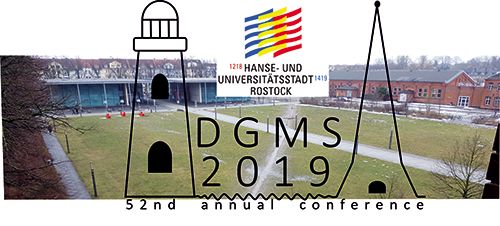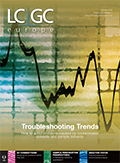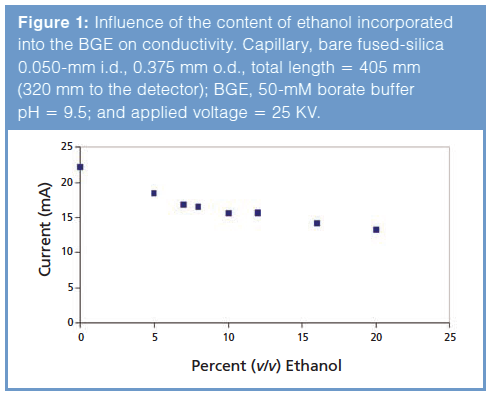The 52nd Annual Conference of the German Society for Mass Spectrometry (DGMS 2019)
The 52nd Annual Conference of the German Society for Mass Spectrometry (DGMS 2019) will be held 10–13 March 2019, together with the Spring Meeting of the German Physics Society (DPG). This double conference will be hosted by the University of Rostock as a main event in its 600-year anniversary celebrations.

The 52nd Annual Conference of the German Society for Mass Spectrometry (DGMS 2019) will be held 10–13 March 2019, together with the Spring Meeting of the German Physics Society (DPG). This double conference will be hosted by the University of Rostock as a main event in its 600-year anniversary celebrations.
The opening ceremony of the DGMS 2019 conference will encompass welcome addresses from representatives of the State of Mecklenburg-Western Pomerania and from the Rector of the University of Rostock. The Sunday evening reception at the Rostock city hall will provide an opportunity to meet the mayor of the city and to become acquainted with the city’s 800-year history.
This year’s Wolfgang Paul Lecture will be given by Professor Vicki Wysocki from the Ohio State University in Columbus, USA. From Monday to Wednesday, the scientific programme of the conference will provide a balanced mix of exciting plenary lectures, parallel sessions, poster presentations, and lunch seminars. Main research topics of the DGMS 2019 conference will focus on affinity mass spectrometry, environmental and forensic mass spectrometry, new instrument developments, ion sources and analyzers, ion physics and ion chemistry, natural product mass spectrometry, proteome research with application in biology and medicine, and structural and functional proteomics.
The invited plenary speakers are:
- Professor Josef Loo, UCLA, California, USA,
- Professor Anton Wallner, ANU Canberra, Australia,
- Professor Silke Merchel, Dresden Accelerator Mass Spectrometry facility, Dresden, Germany,
- Professor Klaus Wendt, Johannes Gutenberg-University of Mainz, Germany,
- Professor Ulrich Boesl Technical University Munich, Munich, Germany.
The scientific programme of the DGMS 2019 conference will start on Sunday with four workshops:
- Core-facilities-Sabine Metzger, University of Cologne, Germany,
- Lipidomics workshop-Robert Ahrend, ISAS Dortmund, Germany,
- LC–MS workshop-Marcel Kwiatkowski, University of Groningen, Netherlands,
- Affinity-MS workshop-Michael Przybylski, Steinbeis Center for Biopolymer Analysis, Rüsselsheim, Germany.
The conference will also feature a company exhibition where information on new industrial developments will be displayed by well-known mass spectrometry, sample preparation, and data analysis companies.
This year’s society laureates who will receive the Mattauch-Herzog Award, the Mass Spectrometry in Life Science Award, the Wolfgang-Paul-Student Award, or the Mass Spectrometric Research Summer Award will be given the opportunity to present their research achievements during the conference.
The DGMS 2019 conference has gained an internationally recognized reputation in the scientific community because of the consistently high standard of the scientific programme. This year’s conference reflects this reputation by the increasing participation of national and international scientists and thus the Society has decided that English will be the conference language. The local organizers, the Proteome Center Rostock, and the Joint Mass Spectrometry Centre of the University of Rostock and the Helmholtz Zentrum München would like to extend a warm invitation to join them for the 52nd annual conference of the DGMS 2019 in Rostock.
E-mail:dgms2019@dgms.euWebsite:https://tagung2019.dgms.eu

Removing Double-Stranded RNA Impurities Using Chromatography
April 8th 2025Researchers from Agency for Science, Technology and Research in Singapore recently published a review article exploring how chromatography can be used to remove double-stranded RNA impurities during mRNA therapeutics production.
The Effect of Time and Tide On PFAS Concentrations in Estuaries
April 8th 2025Oliver Jones and Navneet Singh from RMIT University, Melbourne, Australia discuss a recent study they conducted to investigate the relationship between tidal cycles and PFAS concentrations in estuarine systems, and offer practical advice on the sample preparation and LC–MS/MS techniques they used to achieve the best results.













